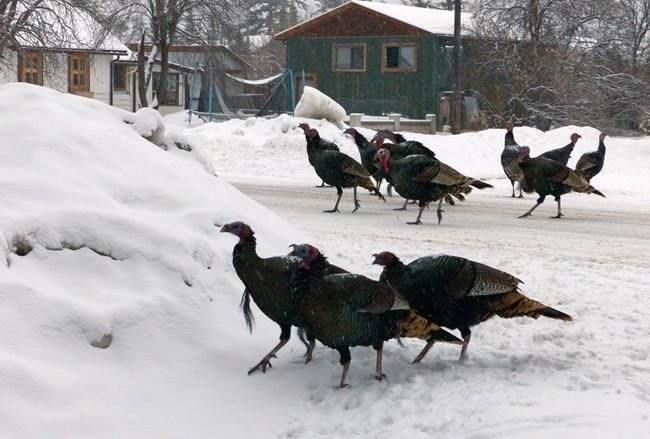
Wild turkeys are shown on a road in this handout image from Edgewater, B.C. The turkeys are creating a flutter in southeastern British Columbia as growing flocks of the birds spend the winter in the region, damaging trees and properties.
Image Credit: THE CANADIAN PRESS/HO-Val Holmes
January 25, 2018 - 6:00 AM
EDGEWATER, B.C. - Celebrations and turkey often go hand in hand but growing flocks of wild turkeys in southeastern British Columbia are leaving area residents feeling anything but celebratory as the birds spend winters in the region damaging trees and properties.
Edgewater residents Val and Mark Holmes are the latest to complain about a flock of as many as 80 of the large and ungainly birds.
"The flock has almost doubled in size," Val Holmes said of the birds that have roosted on her property for the last several years. "There are a lot more young ones this year, judging by the size and the look of them."
"These ones are now very habituated to town so who knows what will happen next year," she said Wednesday.
Holmes said the birds, which she described as about the size of a swan "but fluffier and not quite as long in the neck," arrive every evening during winter and settle on the lower branches of fir trees on her property.
"They get a bit more vocal in the morning, so kind of like a Don Chorus, but it's a bit louder than your usual Don Chorus, so a bit more cackling and just chatting to each other," she said.
Month after month, lower branches of her trees are stripped bare of bark while twigs, smaller branches and all the tree needles are torn off. Even larger branches splinter under the weight of dozens of birds.
"And then there is crap too, of course," Holmes said of the excrement that must be shovelled out from under the trees every spring, along with the downed branches and other debris left by the flock.
Regional District of East Kootenay director Gerry Wilkie blamed the problem on a few people who feed the birds, habituating them to human contact and encouraging them to remain near the community.
Local and provincial regulations don't cover the feeding of non-dangerous wildlife, Wilkie said, adding he is working on a regional district bylaw that he hopes will deter anyone providing food to the turkeys, though the process won't be quick.
Kimberley, Cranbrook and Radium Hot Springs are also on record as trying to manage the problem of wild turkeys, which are not native to the province, although the Atlas of Breeding Birds of British Columbia says populations in the Kootenays have climbed steadily since they were introduced in 1910.
There is a hunting season for wild turkeys but it does not correspond to the period when the birds are roosting near communities, and hunting near homes is illegal.
Some area residents are mulling other ways of getting rid of the turkeys, Wilkie said.
"You could get a large horse trailer, bait the horse trailer, trap them in the trailer and drive them away but the birds are habituated to the town and I don't know what you would do with them," he said, adding any such action would have to be co-ordinated with the Conservation Service.
"I think most people are hoping that public education will work and that people will stop feeding them, in which case they won't show up anymore."
News from © The Canadian Press, 2018